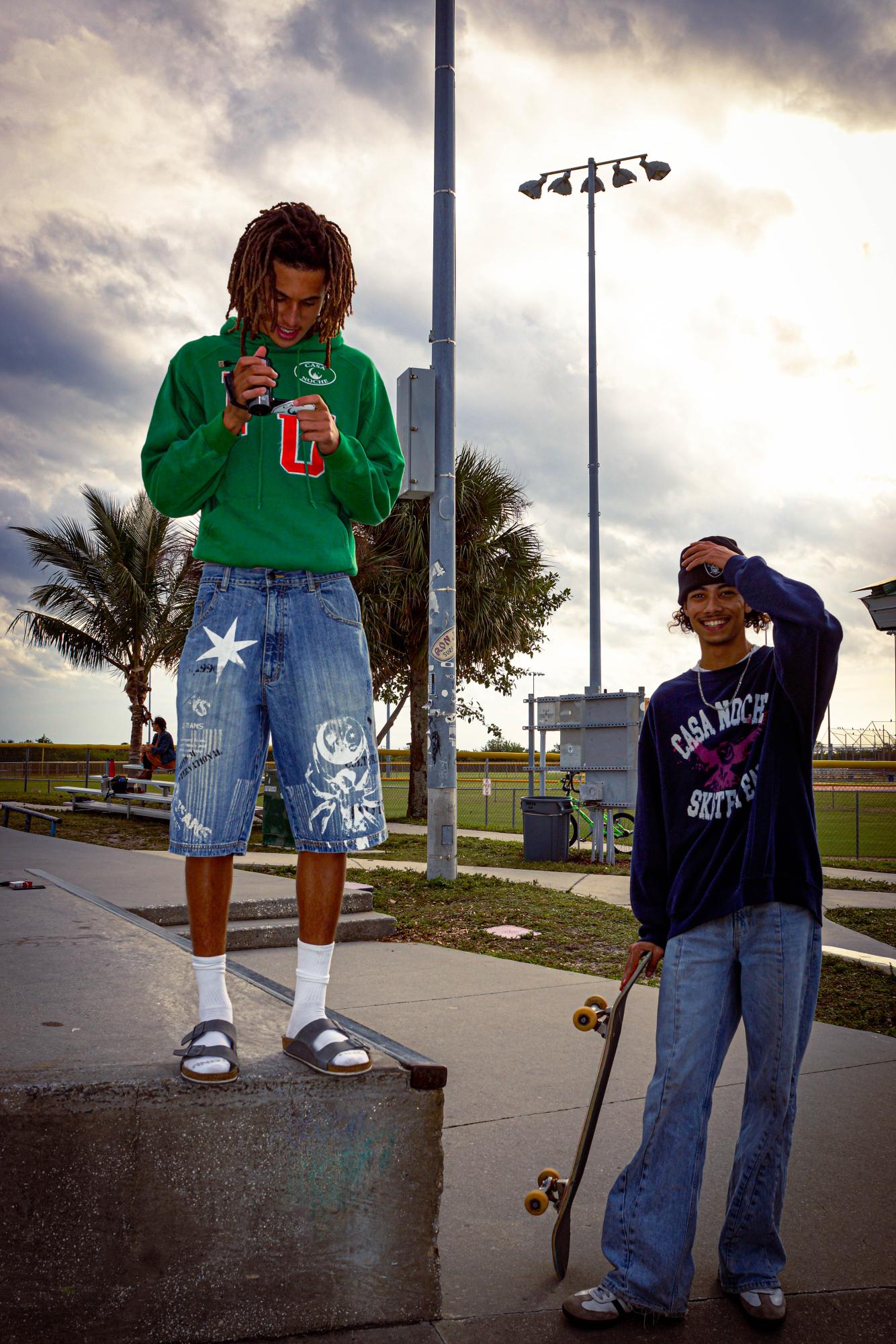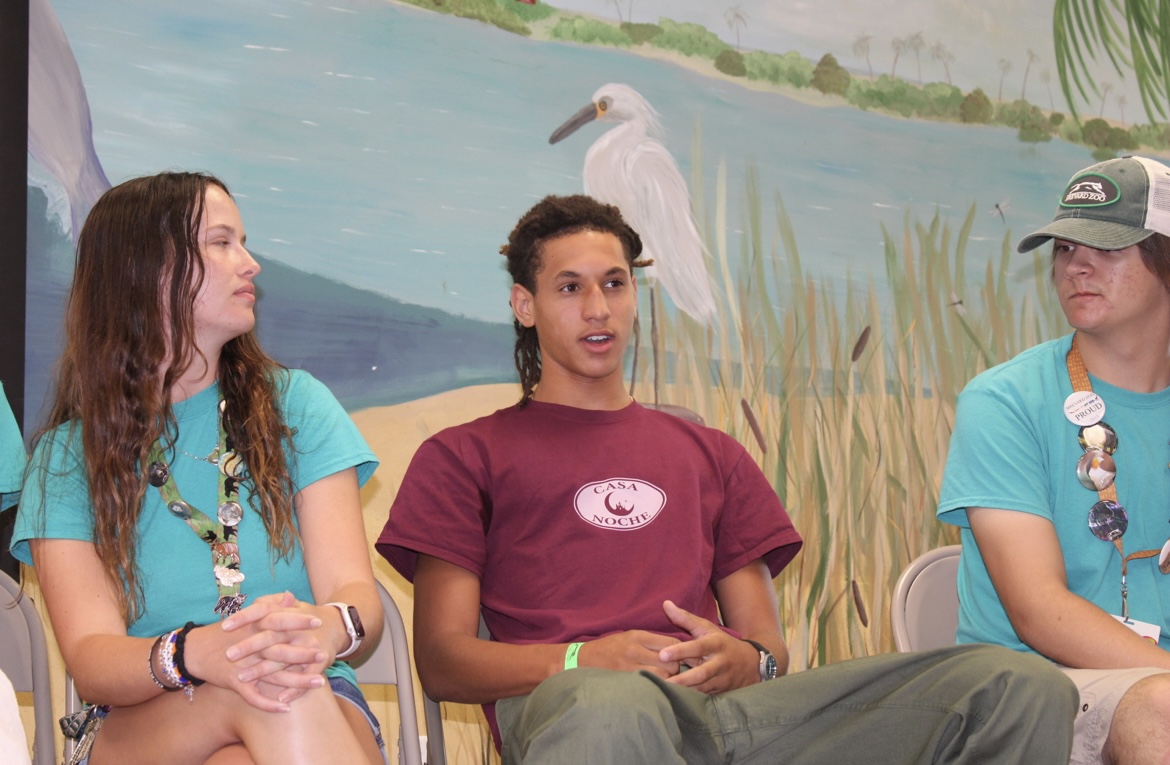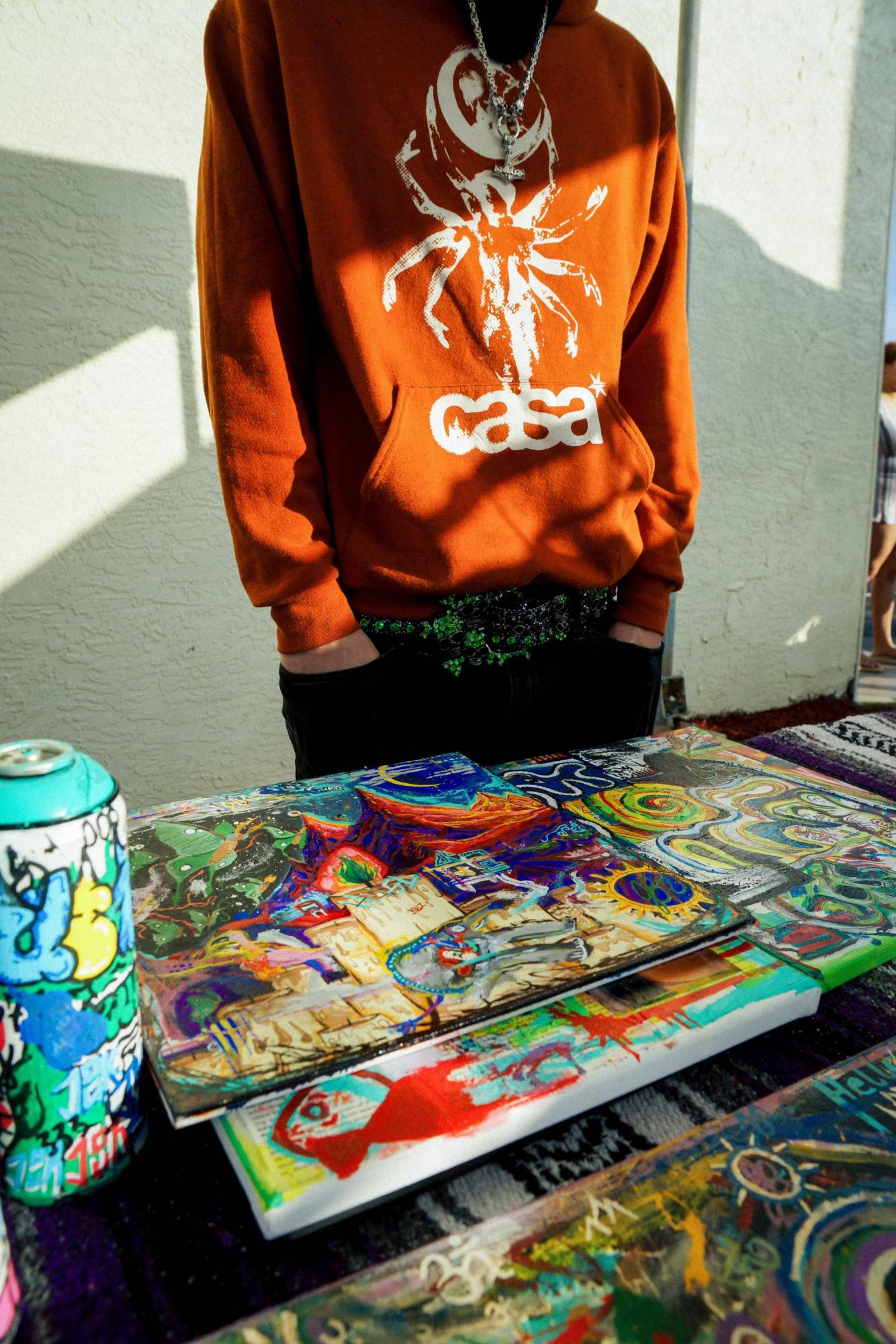Thrift flip

![After creating designs to renovate thrifted clothing, business manager Isaiah Greenidge prints his art at Island Life Screen Printing. "I gave [Greenidge] encouragement to widen [his] profit margin by making [his] own clothes from scratch and doing screen printing and other things [himself]." Komara said.](https://westshoreroar.com/wp-content/uploads/2024/02/71536033407__1E1BFF8E-2A69-471D-B88C-359478BC1CC3-e1709136084495.jpg)
Sifting through discarded clothing, Melbourne High School senior Jonah Vignier and business manager Isaiah Greenidge upgrade plain shirts into fashionable streetwear to feed their mission for a more stylish and sustainable future. For years, Vignier and Greenidge discussed starting Casa Noche, their clothing brand, but it wasn’t until June of last year that “the stars aligned and [they] had to take [their] shot,” according to Greenidge.
“[Jonah and I] began thrifting and repurposing old clothes,” Greenidge said. “Every time you shop at Casa Noche, you’re finding something that nobody else has. We built this as a combination of us wanting to express ourselves in a not-so cut-and-dry way. We just saw a lot of clothing brands that weren’t [making the cut].”
Since Vignier and Greenidge have always been drawn to fashion, they dedicated their business to creating one-of-a-kind designs.
“Jonah saw somebody wearing the same shirt as him and would not shut up about it,” Greenidge said. “They went to Zumi’s and got the same thing, and he never wanted that to happen again.”

While Greenidge said he initially planned to pay someone to print the designs, he found a more streamlined production method.
“We were getting samples done and were looking for screen printers so we could print [the designs] ourselves,” Greenidge said. “We were shopping around trying to find people that might be able to supply us with the materials. We went to this print shop out in Cocoa, and when I left, I had a job there. Now I just go there [to print for Casa Noche].”
At a TEDx Talk about financial education, Vignier met Alexandra Komara, the president of Space Swap — a nonprofit organization for sustainable clothing.
“I had a really good mentor, [Komara], and I still do,” Vignier said. “She’s from around the area, and runs an operation where [Space Swap] was upcycling clothes on a really large scale, recycling 4,000 pounds of clothes. That was really inspiring to me. At the beginning, I wasn’t like, ‘I want to start a sustainable brand,’ but Space Swap really just opened my eyes to a whole different world. We could still maintain all of the liberties that we wanted, but we can make it into something that’s a little bit better for the world.”
![Posing to show off Casa Noche's streetwear-style clothing, Greenidge advertises the clothes at a skatepark. "[The slogan 'Find Your Way Home'] is very open ended," Vignier said. "It means that if you're doing something one way but know it can be done a better way, then go towards that. [Casa Noche is] just trying to make something new out of something we already love."](https://westshoreroar.com/wp-content/uploads/2024/03/DSC05815-2.jpg)
Greenidge said making each article of clothing unique prevents furthering existing waste problems from overconsumption.
“The sustainability aspect of the brand was just a natural progression of upcycling clothing,” Greenidge said. “We just thought, ‘Why don’t we make everything sustainable every step of the way?’ Owning a sustainable brand has caused me to be more mindful and sustainable in my daily life. Now that I’m in the realm of sustainability, I just have it in mind all the time.”
Komara said she taught Vignier how to run a sustainable business.
“[Vignier] volunteered a couple of times [at Space Swap], and once he started building his own clothing brand, [Vignier and Greenidge] found some ‘source’ clothing from us,” Komara said. “I know they have a couple other thrift stores [they get their secondhand clothing from]. We ping-ponged ideas back and forth when they were starting their brand and since then, [Space Swap] has continued to support their brand. We allowed them to come do pop-ups at Space Swap. I gave them a couple of clothing racks that we were no longer using so that it was easier for them to pop up around town.”
![Greenidge shuffles through clothing to sell at a pop-up at the West Melbourne Skatepark. "I'm a little Cuban, but I'm not going to lie and say that's what inspired me to name [Casa Noche]," Vignier said. "The name 'Night House' just wasn't [good enough]. 'Casa Noche' rolls off the tongue a little better."](https://westshoreroar.com/wp-content/uploads/2024/03/DSC05220.jpg)
After Space Swap shut down its brick-and-mortar store, Vignier and Greenidge have done pop-up events at skate parks and plan to do more at Detention Kid Vintage.
“As far as pop-ups go, it’s a lot of research because you have to get in front of people who want to buy your clothes,” Vignier said. “There’s certain places where we didn’t fit in with the exact [consumer audience]. We have a pretty wide scope for a business model as far as the people that want to buy our clothes. For public events, it’s mostly researching where [the location] is and who’s going to be there.”
Vignier said it often takes weeks to plan a pop-up event.
“We have to plan an event two days before it happens, but now we’re getting more formulaic with how we plan everything out for every [clothing] drop,” Vignier said. “We’ll give ourselves at least a week to pray that we have everything and then the next week we can focus on promotion.”
Komara said she isn’t worried about the business lacking organization.

“Jonah [Vignier] is a numbers person,” Komara said. “He’s already good at spreadsheets, and he already figured out how to sell online. [He] has done that successfully in the past just by trial and error. Everything in business is trial and error.”
Vignier committed to Florida State University for its finance program.
“Business has always been what I’ve gravitated towards,” Vignier said. “I remember being in fourth grade selling baseball cards. I always wanted to find a way to make my own money. Entrepreneurship kind of came naturally to me because once I started thrifting and I started looking on Depop and [other thrifting sites], I realized I’m not bad at finding things and I might try to resell them so I can keep finding more.”
While Vignier is going to college next year, Greenidge, who graduated two years ago, decided not to go to college.
“A lot of people don’t need to go to college for business,” Vignier said. “When you’re going to college for a business degree, you’re listening to people who would never run businesses. That [idea] really just inspired [us] to get hands on.”
![In preparation for a pop-up event, business owners Jonah Vignier and Isaiah Greenidge set up Casa Noche skate merchandise. "We have got to find the right clothes [for the audience]," Greenidge said. "If we have a bunch of music tees, we're gonna go to the music store. If we've got a bunch of sport shirts, we're gonna go to Dick's Sporting Goods."](https://westshoreroar.com/wp-content/uploads/2024/03/IMG_8042-e1709566794440.jpg)
In the next six months, Greenidge will move to St. Petersburg, and Vignier will study in Tallahassee. In the meantime, they are trying to set up a brick-and-mortar store in St. Petersburg. Greenidge would be in charge of the in-person store, and Vignier would be in charge of the online store.
“[Greenidge] is my right-hand man, the yin to my yang,” Vignier said. “Frankly, it’s hard for me to be involved in [school, business and sports]. [Although,] I do a lot of online research to find those pop-ups. I’m always on the lookout for them. I think a lot of people discount the part of business that is your network. I mean, connections are everything, like being connected to Space Swap. Otherwise, I gotta attribute the balance to [Greenidge].”
Greenidge plans to continue running the operations for Casa Noche.
“Every day, I’m in the print shop,” Greenidge said. “Every day, I research designs, I make designs, and I make promotional material. It’s just a consistent learning process of learning and doing and learning again. It’s a cycle. Creating, learning, processing, and then creating, learning and processing.”


